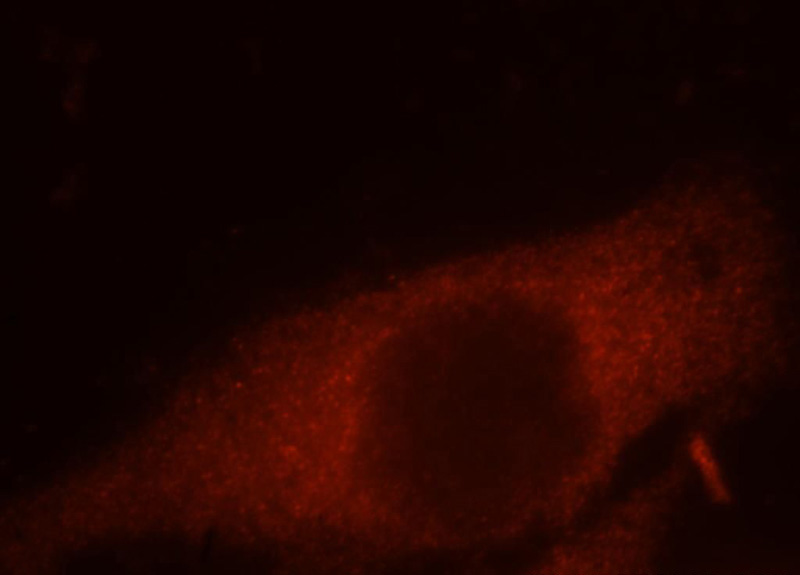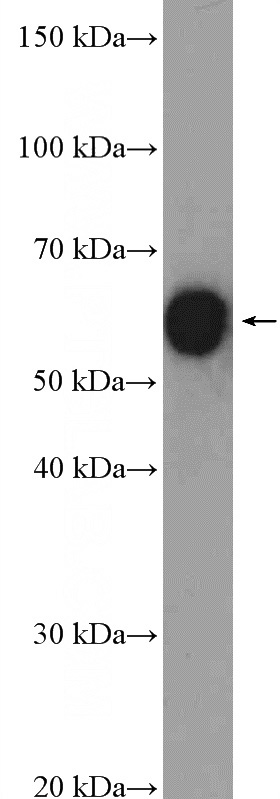-
Product Name
CCT8 antibody
- Documents
-
Description
CCT8 Rabbit Polyclonal antibody. Positive IF detected in MCF-7 cells. Positive WB detected in mouse kidney tissue, Jurkat cells, Raji cells. Observed molecular weight by Western-blot: 60kd
-
Tested applications
ELISA, IF, WB
-
Species reactivity
Human,Mouse,Rat,Zebrafish; other species not tested.
-
Alternative names
C21orf112 antibody; CCT theta antibody; CCT8 antibody; Cctq antibody; D21S246 antibody; KIAA0002 antibody; PRED71 antibody; TCP 1 theta antibody
-
Isotype
Rabbit IgG
-
Preparation
This antibody was obtained by immunization of CCT8 recombinant protein (Accession Number: NM_001282908). Purification method: Antigen affinity purified.
-
Clonality
Polyclonal
-
Formulation
PBS with 0.1% sodium azide and 50% glycerol pH 7.3.
-
Storage instructions
Store at -20℃. DO NOT ALIQUOT
-
Applications
Recommended Dilution:
WB: 1:500-1:5000
IF: 1:10-1:100
-
Validations

Immunofluorescent analysis of MCF-7 cells, using CCT8 antibody Catalog No:109037 at 1:25 dilution and Rhodamine-labeled goat anti-rabbit IgG (red).

mouse kidney tissue were subjected to SDS PAGE followed by western blot with Catalog No:109037(CCT8 Antibody) at dilution of 1:1500
-
Background
CCT8, also named as C21orf112, CCTQ, KIAA0002, CCT-theta, TCP-1-theta and NY-REN-15, belongs to the TCP-1 chaperonin family. It is a molecular chaperone; assists the folding of proteins upon ATP hydrolysis. As part of the BBS/CCT complex, CCT8 may play a role in the assembly of BBSome, a complex involved in ciliogenesis regulating transports vesicles to the cilia. Known to play a role, in vitro, in the folding of actin and tubulin.(PMID:20080638)
-
References
- Seo S, Baye LM, Schulz NP. BBS6, BBS10, and BBS12 form a complex with CCT/TRiC family chaperonins and mediate BBSome assembly. Proceedings of the National Academy of Sciences of the United States of America. 107(4):1488-93. 2010.
- Yamabe K, Maeda H, Kokeguchi S. Antigenic group II chaperonin in Methanobrevibacter oralis may cross-react with human chaperonin CCT. Molecular oral microbiology. 25(2):112-22. 2010.
- Somalinga BR, Day CE, Wei S, Roth MG, Thomas PJ. TDP-43 identified from a genome wide RNAi screen for SOD1 regulators. PloS one. 7(4):e35818. 2012.
- Huang R, Yu M, Li CY. New insights into the functions and localization of nuclear CCT protein complex in K562 leukemia cells. Proteomics. Clinical applications. 6(9-10):467-75. 2012.
- Hirai K, Maeda H, Omori K, Yamamoto T, Kokeguchi S, Takashiba S. Serum antibody response to group II chaperonin from Methanobrevibacter oralis and human chaperonin CCT. Pathogens and disease. 68(1):12-9. 2013.
- Tarkar A, Loges NT, Slagle CE. DYX1C1 is required for axonemal dynein assembly and ciliary motility. Nature genetics. 45(9):995-1003. 2013.
- Shirasaki DI, Greiner ER, Al-Ramahi I. Network organization of the huntingtin proteomic interactome in mammalian brain. Neuron. 75(1):41-57. 2012.
Related Products / Services
Please note: All products are "FOR RESEARCH USE ONLY AND ARE NOT INTENDED FOR DIAGNOSTIC OR THERAPEUTIC USE"
